With locals not disposing of plastic correctly, Thailand is importing the world’s waste instead
A Thai temple that is going green. An NGO that fishes rubbish out of waterways before it reaches the ocean. These are part of efforts to shrink Thailand’s waste problem, the programme Insight finds out. But what else is needed?
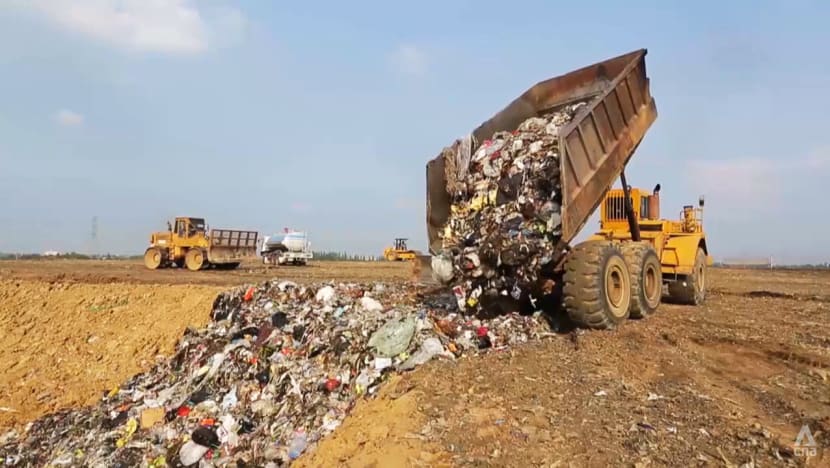
Thailand has more than 2,000 landfills, like this one, but they are filling up quickly.
BANGKOK: A temple south of Bangkok has an unusual ask for its followers: They are encouraged to drop off plastic and glass bottles, milk cartons, paper and other used items.
At the Chak Daeng temple, the items are then sorted. Plastic bottles are compressed into bales that will be sent to a factory to be turned into polymer fibres.
These are then mixed with cotton fibres to become thread, which is woven into fabric.
After the fabric is dyed saffron, it is sent back to the temple to be made into monks’ robes. “If we can make a robe from a plastic bottle, that means we’re following Lord Buddha’s teaching,” said temple abbot Pra Maha Pranom.
Taking care of the environment is in keeping with Buddhist teachings, he added. And believers can do so by “collecting garbage or planting trees”.
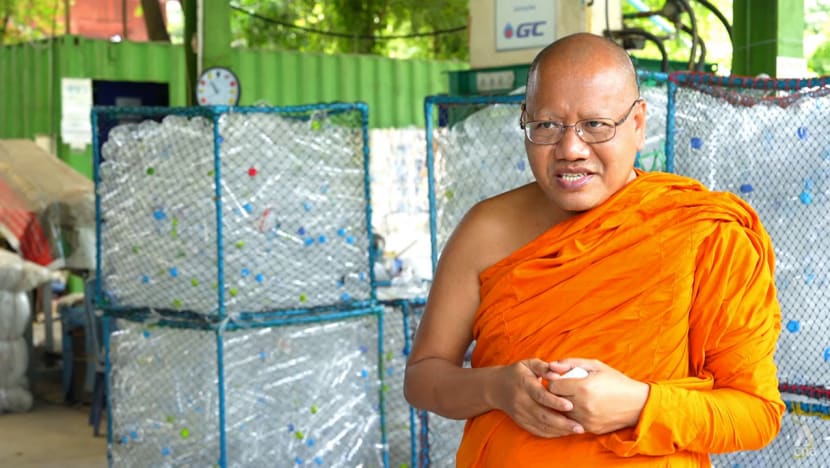
The temple also has found creative uses for the other waste it collects. Milk cartons, for instance, have been used to make roofs, he told the programme Insight.
The temple is an example of how Thailand is trying to tackle its daunting waste challenge.
Before COVID-19, the country generated 28.7 million tonnes of municipal solid waste a year. It also generates about 2 million tonnes of plastic pollution domestically each year and has been identified as one of the world’s top marine plastic polluters.
Plastic waste is a global crisis, and nations are in the process of negotiating a treaty to end plastic pollution. But Thailand’s situation is complicated.
WATCH: Thailand’s eco monks upcycle trash into robes, fuel and school buildings (5:06)
The country imports scrap plastic, and the volume increased in 2018 when China’s ban on waste imports took effect.
The annual amounts imported by Thailand from 2018 vary according to different sources and range from 150,000 tonnes to more than 550,000 tonnes. Actual figures could be even higher owing to improper declaration.
The majority of plastic waste is from Japan, the European Union and North America, said Tara Buakamsri, environmental campaigning group Greenpeace’s country director in Thailand.
WHY IMPORT PLASTIC WASTE?
Why does the kingdom import plastic waste when it generates more than enough to feed its recycling industry? Because much of the local “raw material” ends up in the dumpster, said Natural Resources and Environment Minister Varawut Silpa-archa.
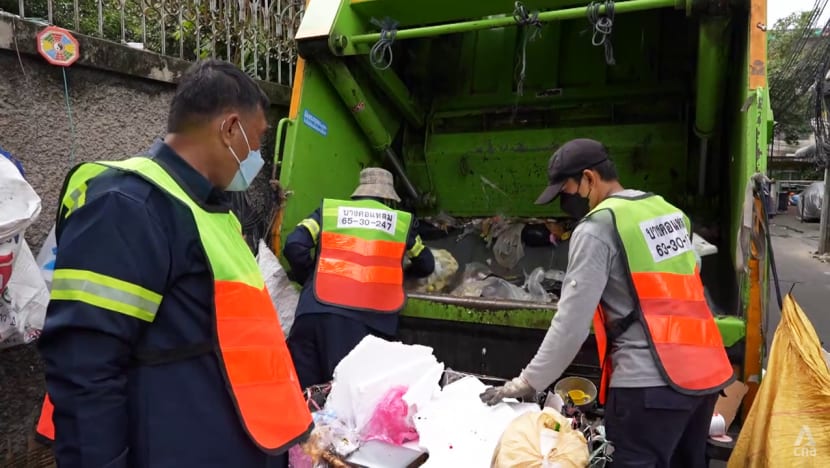
It becomes too costly for recycling companies to clean and process the waste, “so that’s why they started importing the plastic scraps from abroad”.
But the imports are problematic. During inspections, officials would see plastic scraps “the first few metres when you open the container door”, said the minister. “However, when you go deeper … it becomes plastic waste or just waste altogether.”
The authorities have encountered “quite a few incidents” and will send the waste back to the country of origin, he added.
But tracing its origin can be difficult, according to Tara. “In many cases, we see the plastic … sitting at the port,” he said.
With no one claiming ownership, “it becomes a burden on local governments and (agencies at) other levels to deal with it”.
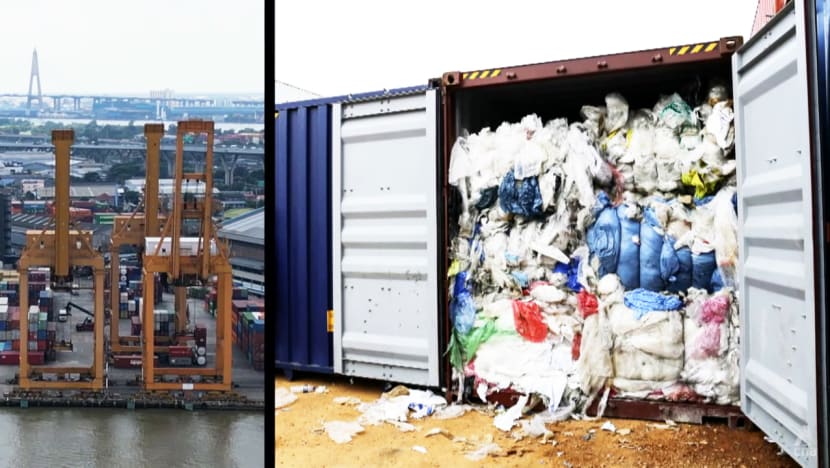
Developed countries must stop exporting toxic waste to developing countries, he added. But, on the other hand, Thailand’s waste management system is “not really addressing how we can utilise the recycling system for plastic waste”.
Thailand has more than 2,000 landfills, which are filling up “very quickly”, acknowledged Varawut. The country must cut the amount of rubbish going in, he said.
It has taken some steps. Thailand aims to stop plastic waste going into landfills by 2027, by creating a circular economy to recycle and reuse the resource.
At the start of this year, the government banned four types of plastics, including single-use plastic bags and polystyrene food containers. Observers have commended the policy but wondered if it is being fully enforced.
WATCH: Why is Thailand the world’s dumping ground for plastic and waste? (45:51)
Thailand is also set to ban scrap plastic imports in 2025, starting with import limits next year.
TREES DIED, NOTHING COULD GROW
Poor waste management can have a host of other insidious effects.
Rubber farmer Tieb Samarnmit in Rayong province has seen this with his own eyes. His trees have died in recent years, and the alleged culprit is a nearby waste processing factory operated by a company called Win Process.
According to the villagers of Nong Phawa, the company had dumped hazardous waste, including scrap plastic and used oil, illegally for years. They called on the authorities to investigate in 2013, and the factory was ordered to stop operating and remove the waste.
“The water in the pond started to get smelly. In 2013, it finally turned dark,” said Tieb.
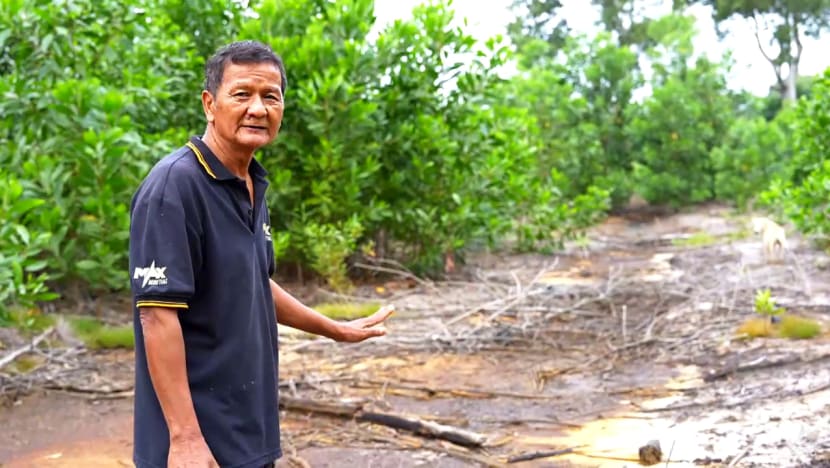
Yet, in 2017, Win Process obtained permits to operate. By 2020, many of his trees died.
“You can’t grow anything in this area. Plants are usually able to grow in such land, but no matter what we tried, they wouldn’t grow,” he lamented, pointing to “yellow liquid” coming out of the ground.
“I tried many things, such as bananas, betel nuts, mangoes and vegetables.”
With help from non-governmental group Ecological Alert and Recovery – Thailand, the villagers sued Win Process last year. The lawsuit is ongoing.
This case shows weaknesses in enforcement and the granting of permits, say observers. When they find violations of the law, government agencies tend to suspend companies’ licences, said Naresuan University law lecturer Ashijya Otwong.
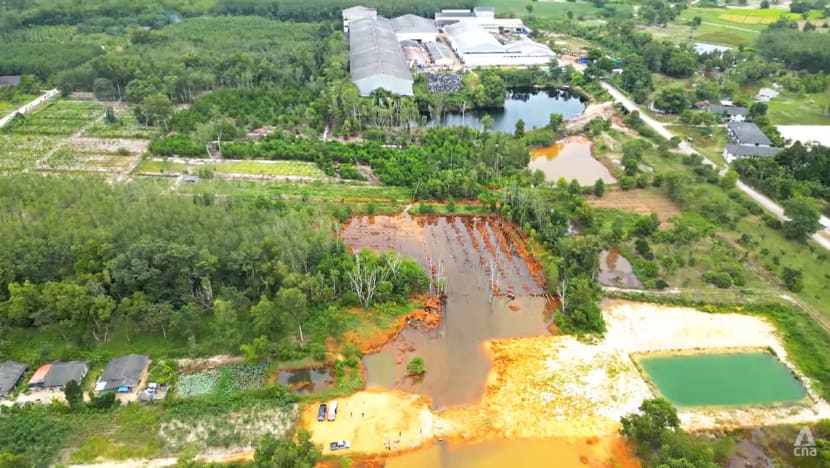
Factories are allowed to reopen after they fix the problem, even if they repeat the offence “more than 20 times”, she said. “We have to think about the permission process, monitoring process and also how to enforce the law.”
The lack of a central agency with oversight could be a factor.
Because a few ministries oversee scraps, local rubbish collection and factories, “we have more … restrictions and obstacles”, said Varawut. Another ministry may not view a company’s action in the same way as his ministry.
He does not have the authority to shut down a company responsible for an illegal dump site or to make arrests, he said. “I have to file a complaint with the police. And then the police would proceed … accordingly.”
Company licensing falls under the Ministry of Commerce, while licences to operate factories fall under the Ministry of Industry, he added.
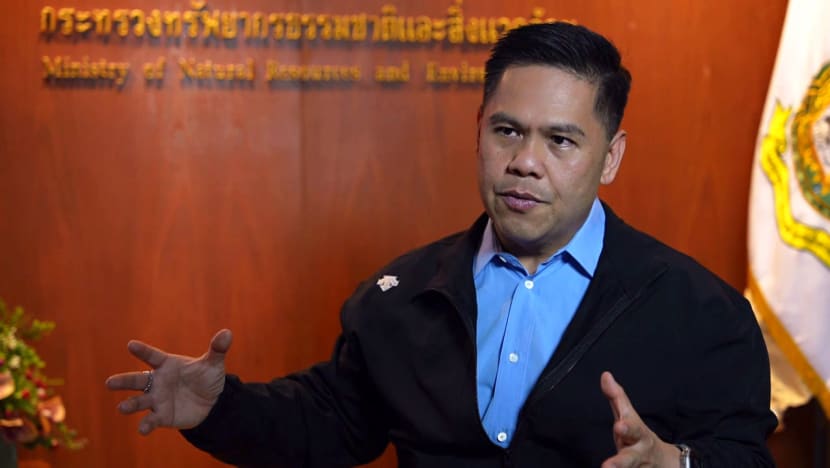
FOUL AIR, AND GREATER RISK OF FLOODS
Like Ashijya, non-governmental organisation worker Sumniang Boonlue believes it is up to the government to better address the problem of waste dumping.
He does not blame the consumers whose rubbish he fishes out of a waterway. “The state didn’t provide enough facilities. They couldn’t find a place to dump trash when they needed it, so they dumped the trash in the canal instead,” he said.
The Lat Phrao canal happens to be his home. His family have lived along the tributary of the Chao Phraya River for generations and “use the water from the canal for everything” after purifying it — until his generation, that is.
The freshwater snails and small prawns that residents used to find have all gone. Trees along the canal cannot be watered using the canal’s polluted water or they would die.
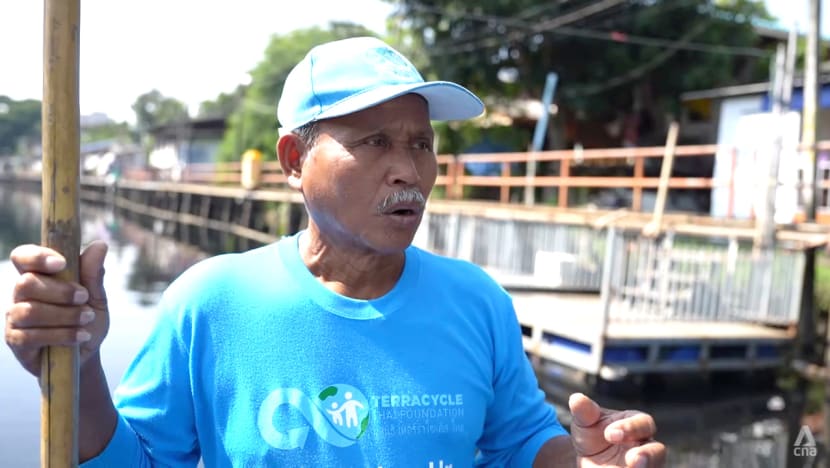
“When we wake up, we smell the foul air,” Sumniang said. “People in the community feel unhealthy because we always smell this foul air.”
Since the pandemic, he has had to remove more rubbish from the canal. From a tonne a day, his team from the TerraCycle Thai Foundation are hauling an extra 400 to 500 kilogrammes.
“During the COVID-19 pandemic, we were very tired because there was so much waste,” he said. “Because of the lockdown, people couldn’t go out, so they spent all their time eating at home.”
And they dumped more food and beverage containers in the canal.
As a senior staff member of the TerraCycle Thai Foundation, Sumniang helps to curb pollution by capturing waste closer to its source.
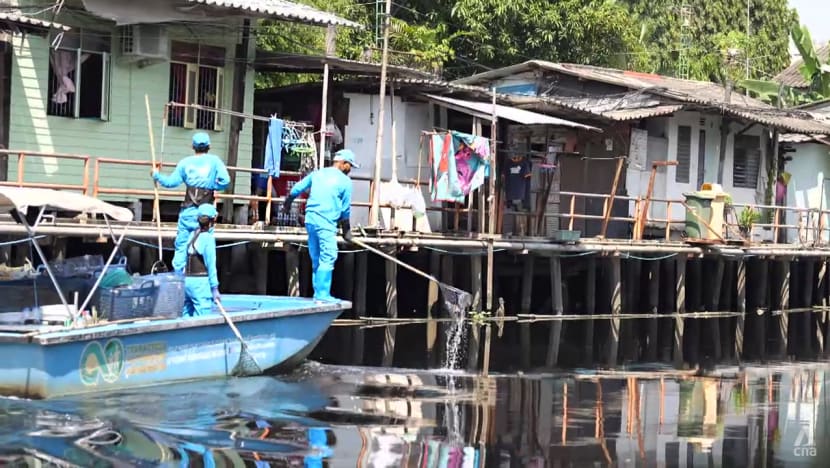
By the time plastic is carried to the ocean, it is less recyclable, explained the foundation’s executive director, James Scott. The other consideration is to have a better chance of changing people’s views and behaviour, he said.
Cleaner waterways also help to mitigate floods. Waste in canals traps other debris and more sediment. This reduces the capacity of canals and increases the risk of flooding, he noted.
Once the plastic that TerraCycle collects is dried and sorted, it is compressed and sent to a recycling facility to be turned into products such as bracelets and coasters. Organic waste is sent to landfills.
Ultimately, what is needed is to reduce the volume of plastics produced and used, some experts believe.
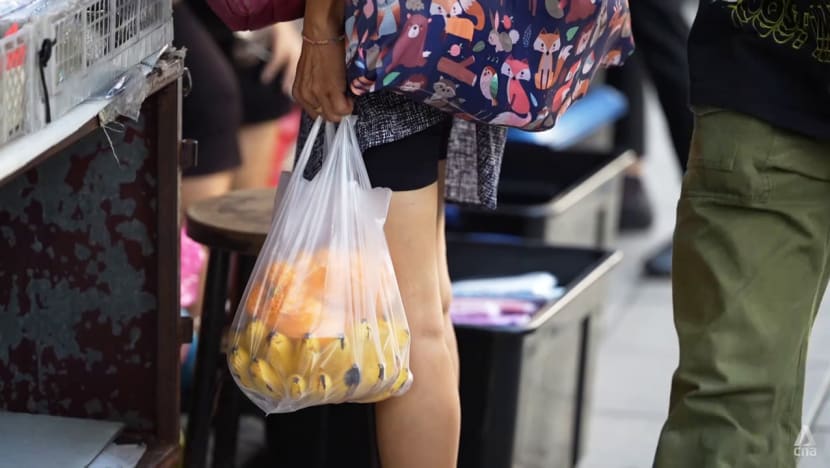
“There’s no clear policy to force the producers to reduce the amount of plastic in their products or change their materials (and) not use plastic any more,” said Ashijya. The government should support private-sector players that are making strides in this area, she added.
Scott would “love to see some zero-waste communities”. But this would entail major changes. He cited the way companies deliver their products, authorities adjusting policies on product manufacture and waste management and the way individuals consume and manage their waste.
“We need to do a lot more, and everybody else needs to get more involved,” he said.
Watch this episode of Insight here. The programme airs on Thursdays at 9pm.




















